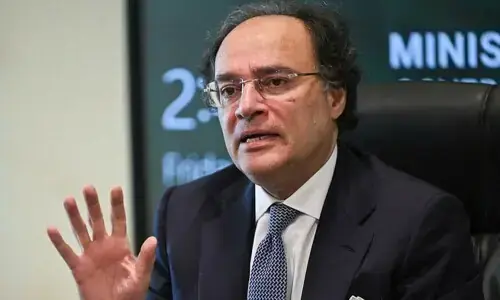Finance Minister Muhammad Aurangzeb said that Pakistan, like several other emerging markets, must build stronger fiscal and external buffers to withstand global uncertainties.
Addressing an event on Wednesday, Aurangzeb said that several emerging markets, including Pakistan, continue to be on a path of a structural reform agenda.
“The uncertainty is there, in terms of geopolitical tensions, trade fragmentation and supply chain readjustments, not disruptions, but readjustments.
“Therefore, every country, including Pakistan, needs to ensure that we build fiscal and external buffers to deal with exogenous shocks,” he said, citing border tensions and internal law and order situation.
“The federal government and the Ministry of Finance need to ensure that these buffers are in place.”
The finance minister reiterated that the country has achieved macroeconomic stability. “However, we want to avoid a gold rush situation,” he said.
Citing data, Aurangzeb said that in the first four months, large-scale manufacturing grew around 4% year-on-year. “We need to be cautious because this is not yet a trend, but the underlying variables and building blocks are positive,” he said.
Aurangzeb noted that Pakistan has increasingly emerged as a viable destination for foreign investment.
Talking about multinationals, the finance minister noted that MNCs make their participation choices, “for their own ROIs, ROEs and other reasons”.
“There is also a shift from West to East,” he said.
“Three weeks ago, I myself was at Google’s forum when their senior management visited Pakistan — not only announcing their office opening but also that Pakistan will become a technical and export hub for Google.”
On structural reforms, the finance minister shared that policymaking is not part of the Federal Board of Revenue (FBR).
Aurangzeb also shed light on recent policy measures aimed at supporting the export sector.
“Initially, the Working Group proposed, led by Musadaq Zulqarnain, to suspend the Export Development Surcharge (EDS). However, the prime minister decided to abolish it completely,” he said, terming the development a positive for the export sector.
The government on Monday decided to withdraw the 0.25% EDS on exports with immediate effect, providing long-awaited relief to exporters and improving Pakistan’s competitiveness in global markets


